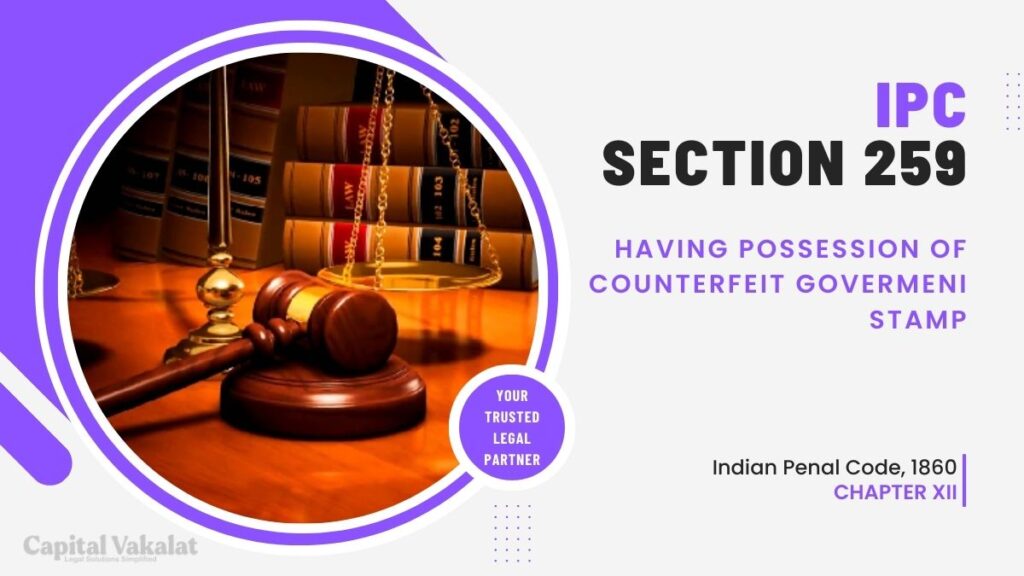In the world of law, the Indian Penal Code (IPC) stands as a robust framework that addresses various criminal activities. Among its sections, Section 259 specifically deals with a matter of utmost importance – the possession of counterfeit government stamps.

This article will explore the intricacies of Section 259 IPC, shedding light on the provisions, implications, and the broader context surrounding this legal provision.
Introduction to Section 259 IPC
Section 259 of the Indian Penal Code (IPC) deals with an offense that has serious implications for the security and integrity of government documents. It pertains to the possession of counterfeit government stamps, which are often used in various official transactions, and fraudulent activities surrounding them. This section aims to deter individuals from engaging in such illegal practices, safeguarding the credibility of government documents.
Understanding Counterfeit Government Stamps
Counterfeit government stamps are imitation stamps that mimic genuine government-issued ones. These fake stamps are often used to evade payment of legitimate fees and taxes, causing financial losses to the government. They can be utilized in a wide range of activities, from document forgeries to tax evasion schemes.
The Legal Provisions of Section 259 IPC
Section 259 IPC outlines the specifics of possessing counterfeit government stamps. It criminalizes the possession, sale, or use of counterfeit stamps with the intent to defraud or cause financial loss to the government. This provision serves as a legal mechanism to maintain the integrity of government documents and financial transactions.
Punishments and Penalties
Those found guilty under Section 259 IPC can face severe penalties. Depending on the severity of the offense and other circumstances, the court may impose fines, imprisonment, or both. These penalties aim to discourage individuals from engaging in such fraudulent activities.
Intent and Knowledge: Crucial Elements
To convict someone under Section 259 IPC, the prosecution must establish that the accused possessed counterfeit government stamps with the intent to defraud or cause financial loss to the government. Proving intent and knowledge is crucial in these cases, as mere possession may not always lead to a conviction.
Recent Cases and Precedents
Several cases in India’s legal history have shed light on the interpretation and application of Section 259 IPC. Courts have taken a nuanced approach, considering the specific circumstances and intent of the accused. These cases set important precedents for future legal proceedings.
Defenses Against Section 259 IPC Charges
Defendants in Section 259 IPC cases can employ various defenses, including lack of knowledge, absence of intent to defraud, or challenging the evidence presented by the prosecution. Legal experts often explore these defenses to protect the rights of the accused.
The Significance of This Legal Provision
Section 259 IPC holds immense significance as it serves as a deterrent against counterfeiting government stamps. It also upholds the credibility of government documents and ensures that legitimate financial transactions are conducted transparently.
The Burden of Proof
In Section 259 IPC cases, the burden of proof lies with the prosecution. They must establish the guilt of the accused beyond a reasonable doubt. This standard ensures that convictions are based on strong evidence and a fair legal process.
Conclusion
Section 259 IPC plays a vital role in preserving the sanctity of government documents and financial transactions. Possession of counterfeit government stamps is a grave offense with serious consequences. By understanding the legal provisions and implications, individuals can better appreciate the significance of upholding the law.
Frequently Asked Questions
What are the penalties for violating Section 259 IPC?
Penalties for violating Section 259 IPC may include fines, imprisonment, or a combination of both, depending on the nature and severity of the offense.
How does the court determine intent in Section 259 IPC cases?
The court examines the circumstances and evidence to determine whether the accused possessed counterfeit government stamps with the intent to defraud or cause financial loss to the government.
Can one be charged under Section 259 IPC without knowing they possessed counterfeit stamps?
While knowledge of possession is crucial in Section 259 IPC cases, if an individual can prove their lack of knowledge, it may serve as a defense against charges.
Why is Section 259 IPC significant in the legal framework of India?
Section 259 IPC is significant as it aims to prevent the use of counterfeit government stamps, ensuring the integrity of government documents and financial transactions.